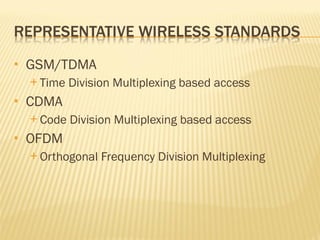4 g mobilecommunications
- 2. Where are we? Where do we Want to go? 3G vs 4G 4G Process Challenges
- 3. Hyper Lan- set of wireless Lan 1G-First Generation Speech 2G-Second Generation SMS , MMS CDMA , GPRS , EDGE Voice Mail 3G-Third Generation Wireless Internet Video Calling Mobile TV
- 4. High transfer rate Internet access any where Ability to move around with the same IP address Utilization of Smart antennas High resolution Mobile TV
- 5. GSM/TDMA Time Division Multiplexing based access CDMA Code Division Multiplexing based access OFDM Orthogonal Frequency Division Multiplexing
- 6. 3G Vs 4G Technology 3G 4G Data Transfer Rate 3.1MB /sec 100MB/sec Internet services Broadband Ultra Broadband Mobile -TV Resolution Low High Bandwidth 5 - 20 MHz 100 +MHz Frequency 1.6- 2 GHZ 2 – 8 GHz Network Architecture Wide Area Network Hybrid Network
- 8. Machine-to-machine transmission -Sensors (measure parameters) -Tags (read/write equipment) Consented to achieve 500bit/s/Hz/km2 -HSDPA (High Speed Download Packet Access) -MIMO WWI agreed peak rates of 100Mbit/s in mobile situations1Gbit/s in nomadic/pedestrian situations Service Evolution and Consensus
- 9. 4G Process To operate large number of users - Parent coverage - Pico-cell coverage
- 10. Mobile IP VoIP Ability to move around with the same IP address IP tunnels Intelligent Internet Presence Awareness Technology Knowing who is on line and where Radio Router Bringing IP to the base station Smart Antennas Unique spatial metric for each transmission
- 11. Key Technologies Required for 4G OFDMA -Time domain -Space domain -Frequency domain
- 12. Key Technologies Required for 4G MIMO Signal multiplexing between antennas -Smart antennas Well suited to OFDM
- 13. Key Technologies Required for 4G Coverage Parent coverage ------ Pico-cell coverage
- 14. Challenges Sufficient spectrum with associated sharing mechanisms. Coverage with two technologies. Caching technology in the network and terminals. OFDM and MIMO. IP mobility. Multi-technology distributed architecture. Fixed-mobile convergence (for indoor service). Network selection mechanisms.
- 15. Life-Saving: Telemedicine Video Conferencing Telegeoprocessing: GIS,GPS Better Usage of Multimedia Applications Voice over Internet Protocol (VoIP) for IPv6
- 16. Mobile Intelligent Internet and multi media applications Seamless Roaming, substantially high and selectable user bandwidth, customized QoS, Intelligent and responsive user interface Mobile IP, Radio Routers, smart Antennas Continued advances and challenges from 1G -> 4G Modulation techniques, transreceiver advances, fast manipulations, user interfaces, IP tunelling and firewalls Spectrum usage, regulatory decisions, “one” standard, authentication and security, multi disciplinary co-operation Packing so much intelligence in smaller and smaller physical space, esp. User Equipment (UE) IP + WPAN + WLAN + WMAN + WWAN + any other stragglers = 4G
- 17. Any Queries?
- 18. Thank U


















